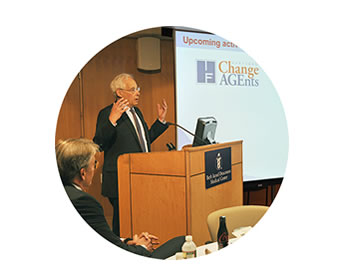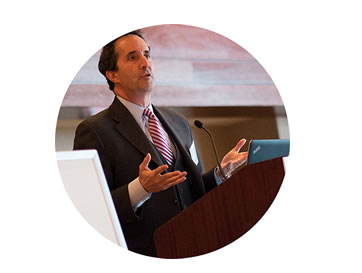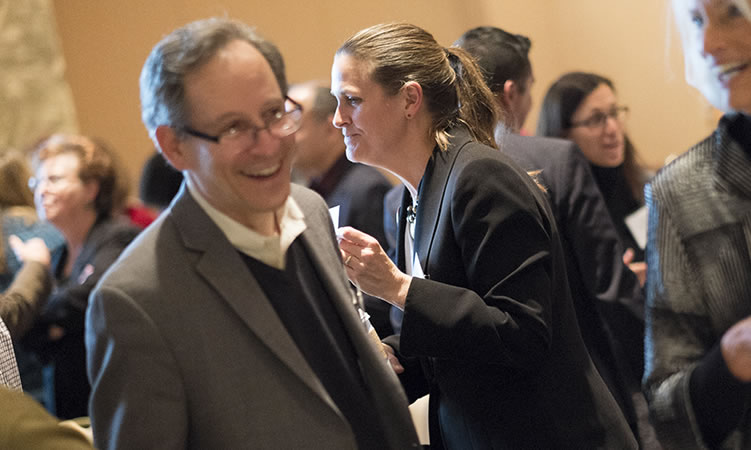![]() Creating
Creating
Change
Every Day

 Donald Berwick,
former administrator of the
Centers for Medicare and
Medicaid Services, speaks to
Hartford Trustees in Boston.
Donald Berwick,
former administrator of the
Centers for Medicare and
Medicaid Services, speaks to
Hartford Trustees in Boston.
 John
Beilenson, president of SCP,
leads a conference session.
John
Beilenson, president of SCP,
leads a conference session.
Over the past three decades, the Hartford Foundation has invested hundreds of millions of dollars in developing new generations of faculty and researchers with the skills, knowledge, and passion to improve the quality of care for older Americans. As the Foundation pursues its new strategic direction, we are directly building on this work with the Hartford Change AGEnts Initiative. This wide-ranging effort is focused on accelerating sustained practice change that improves the health of older Americans, their families, and communities. It deliberately seeks to harness the collective strengths, resources, and expertise of the Foundation’s interprofessional community of more than 3,000 scholars, clinicians, and health system leaders.
Across the country, Change AGEnts are working to engage older adults and their families, along with other key stakeholders, in the design and implementation of evidence-based, high-value interventions, programs, services, and practices that make a real and sustainable, large-scale impact on the quality of care delivered to older Americans.
 Members of the Hartford
Change AGEnts leadership team.
Members of the Hartford
Change AGEnts leadership team.
Launched in late 2013, the Change AGEnts Initiative is guided by a collaborative leadership team that includes Foundation staff; representatives from the Gerontological Society of America (GSA), which manages the initiative; SCP, a socially responsible communications consulting firm; and other leaders in the aging and health field, including Laura N. Gitlin, PhD, director of the Center for Innovative Care in Aging at the Johns Hopkins School of Nursing, and Nancy Whitelaw, PhD, a former GSA president.
One core strategy of the Change AGEnts Initiative is to build a vibrant Change AGEnts Community. We know that any true practice change requires a team effort that draws on the perspectives, experiences, and best thinking of health professionals across disciplines. During the first year of the program, we have intentionally sought to bring together Hartford physicians, nurses, social workers, health system leaders, and others so they can collaborate in a variety of ways.
 Gregg Warshaw, MD, networks with fellow Change AGEnts at the annual conference.
Gregg Warshaw, MD, networks with fellow Change AGEnts at the annual conference.
Alumni of many Hartford Foundation programs have gathered at interprofessional training institutes on policy and communications and through a series of skills and informational webinars. They have collaborated on grant applications for the program’s one-year, $10,000 Action Awards or through “cross-listed,” practice change-focused awards made in partnership with efforts funded under Hartford’s previous grantmaking strategy, most notably the Paul Beeson Scholars program, the Hartford Centers of Excellence in Geriatric Medicine, and the Hartford Geriatric Social Work Initiative. They have also found a virtual town square/workspace in the Change AGEnts online platform (found at ChangeAGEnts365.org). This standalone social network offers a searchable database of members, a forum to share ideas and information, opportunities for mentoring, and the ability to create Action Communities to address topics from health technology to delirium prevention.
The Change AGEnts Networks draw from the broader AGEnts community. These small, interprofessional workgroups focus on specific practice change challenges and capitalize on members’ expertise, experiences, and extensive connections to organizations and individuals. Drawing on the inspiration of the MacArthur Foundation’s many successful networks, we started with two networks to test the concept: one is working to advance family caregiving for older adults with dementia (see A Bridge to Better Lives for Family Caregivers), while the other aims to transform primary care patient-centered medical homes so they ultimately improve outcomes for older adults and their caregivers.
If these networks and the concept proves itself, we will look for networks to jell from the membership and win support to address other vital challenges.
In December 2014, the initiative marked the end of its first year with an intensive, day-and-a-half conference that brought together more than 160 Change AGEnts in Philadelphia. Highlights included:
Looking ahead, the Change AGEnts Initiative will continue to seek ways to drive widespread and systemic practice change. We trust that the connections forged during 2014 will lead to new and exciting projects to improve the delivery of care for older adults and their families. On the pages that follow, you’ll read about people and projects that represent only a small sample of the important work being done in each of our five strategic funding portfolios.